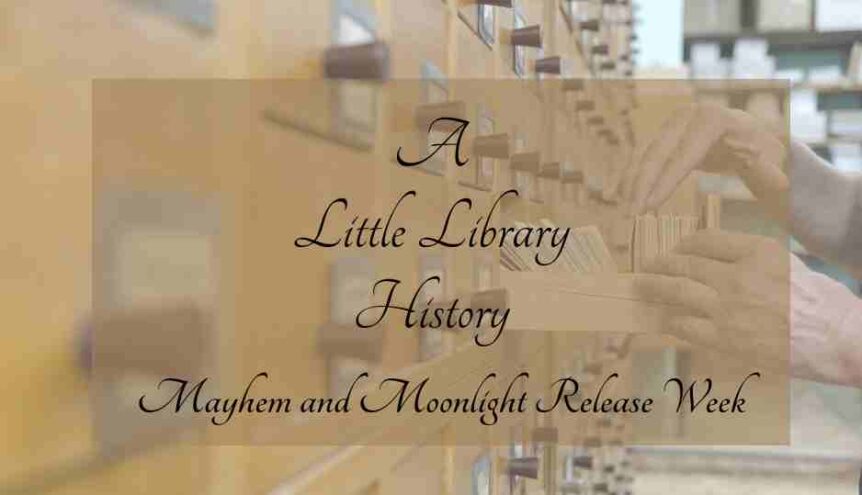 It’s that time—release week for Book 3 in my Bedford County series—Mayhem and Moonlight. If you’ve gone down this path with me before, you know I share a daily post about something pertinent to the book or setting. I also offer a chance to win a prize with each post—this time it’s a $25 Amazon Gift Card.
It’s that time—release week for Book 3 in my Bedford County series—Mayhem and Moonlight. If you’ve gone down this path with me before, you know I share a daily post about something pertinent to the book or setting. I also offer a chance to win a prize with each post—this time it’s a $25 Amazon Gift Card.
Since Lillian Murphy is a librarian, I decided the focus would be on libraries. It’s that or Luca’s career as a productivity expert, and that would get pretty dull after the first post.
So, let’s kick off this release with a little library history. There is some disagreement about the founding of the first library, but it was well before the ALA (American Library Association). One of the most accepted answers to this question is that the first Library of Philadelphia was founded by Benjamin Franklin in 1731. Good ol’ Ben. He had his hand a lot of pots back in his day. This wasn’t a “free” library, though. It was what they called a “subscription” library and was supported by its members. Kind of like paying for a magazine subscription, I imagine.
This idea grew, and there were many of these types of libraries springing up in the U.S. But it catered only to those who could afford to pay the fees.
Maybe you’re too young to remember what a card catalogue is—now, everything is computerized. I miss the old days. When I was a kid, the library where I grew up was in an historic building with fifteen-foot ceilings, ornate dark wood shelving, leaded glass windows and acoustics any musician worth his salt would die for.
The card catalogue was so large, it took up precious real estate in that building.
It wasn’t until 1840 that the card catalogue was created at Harvard. It was also the year that the University of South Carolina opened the first separate academic library building. Until then, university libraries were housed in multi-use buildings, kind of thrown in with other offices—like our government buildings today. It remains the oldest continually operated library building in the country.
In 1854, the Boston Public Library opened—the first American library to be supported by taxpayers. There was a commitment to offer the opportunity of equal education as well as the freedom of thought and expression. This library movement was influenced by the industrial revolution, urban growth and the accumulation of private and public wealth.
What we think of now as an image of organized houses of information started out with a lot of lacks—standards of service, adequate funding, proper cataloguing (which inspired the card catalogue mentioned above), and professional librarians.
That’s where I want to focus for a moment. Librarians. There was no such thing as a professional librarian until it was resolved at a library conference in 1876 to make this occupation a profession. And that’s when the American Library Association founded and systems for organizing the information in libraries were developed.
The inspiration for Lillian’s profession as a librarian came from my daughter. There was a time Nikki was going to be an FBI agent or a veterinarian or… so many other career choices other than librarian. It was her love for books—especially old books—that drew her to becoming a librarian. She worked at several libraries while attaining a master’s degree in library and information science. Landing one where she could actually use her degree wasn’t so easy. Just like Lillian, she worked at a job that didn’t require more than a high school diploma—until recently.
Public libraries depend on funding. Funding depends on people who continue to see value in them. Although they have shifted radically from their inception (no more of those cool card catalogues), some believe that they will become obsolete in time because of the Internet. But this is one institution that can fill the gap between the “haves” and the “have nots” by providing public access to computers and teaching those in need how to find information. Not everyone is fortunate enough to be able to afford a home computer.
If you doubt that libraries can impact the lives of the less fortunate, read this article on why Dolly Parton devoted much of her life to helping children read.
Enter here for your chance to win a $25 Amazon Gift Card. Be sure to come on back tomorrow to continue this library journey and enter for another chance to win the $25 Amazon Gift Card.
You can still get the ebook version of Mayhem and Moonlight for the preorder price of $2.99. Be sure to claim your preorder gift by filling out the form from my publisher’s website. Just have your Amazon order number handy. If you prefer the paperback version, it is now available and already includes the preorder gift.






